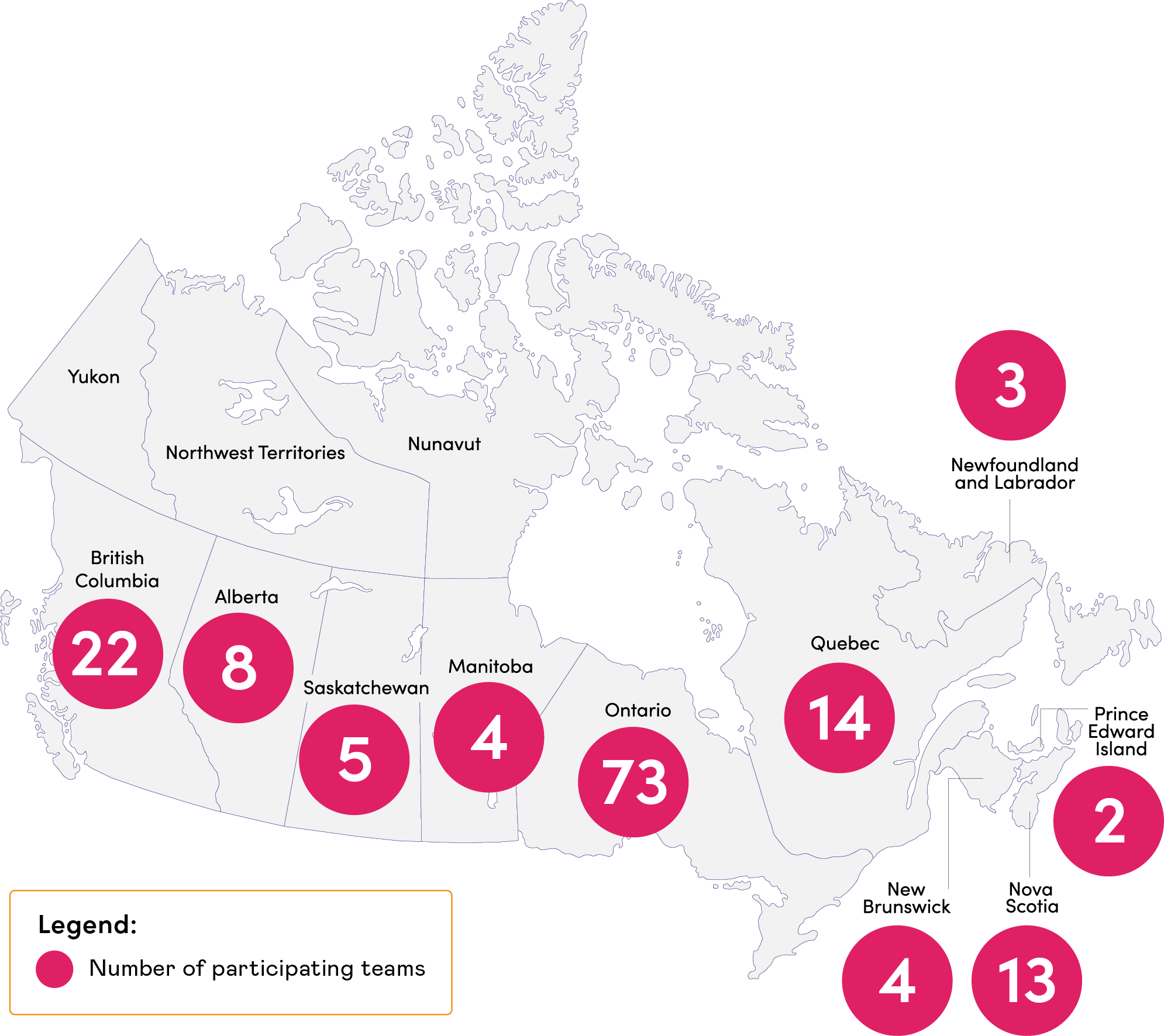“Our mission was to truly understand our staff’s needs before proposing solutions. We found that recognition and greater visibility from leadership was the top concern. We engaged with the Challenge at every level—Board, senior leadership, and frontline staff. This led to a 70% drop in our vacancy rate and a significant improvement in retention.”
- Karimah Alidina, Chief Nursing Executive, Runnymede Healthcare Centre

How healthcare organizations are addressing workforce challenges
Nearly three-quarters of reporting teams made progress on their goals during the Challenge, improving turnover rates, work-life balance and patient care. By fostering a culture of creativity and continuous improvement, teams found that even small changes can make a significant difference for their workforce.
Inspiring outcomes from different settings include:
- Family health team: Trialed an optional compressed work week that maintained the same level and access of service for patients while improving work-life balance.
- Rehabilitation and complex continuing care hospital: Implemented improved scheduling models, leadership visibility and engagement, wages, and professional development, leading to significant reductions in their monthly turnover rate.
- Emergency medical services team: Extended shifts from 10.5 hours to 12 hours, which allowed staff to retain their vacation and sick leave benefits as full-time employees, boosted provider satisfaction, introduced a break, enhanced camaraderie, and improved patient care.
- Primary care centre: Introduced a voluntary compressed work week that led to a 30 percent jump in work-life balance ratings in less than three months.
- Children’s hospital emergency department: Made intentional efforts to improve team culture, which resulted in a 22 percent improvement in emotional exhaustion scores and overall wellbeing.
- Allied health professionals: Focused on strengthening accessible and responsive leadership, which resulted in turnover rates dropping by more than two-thirds year-over-year.
Six Strategies for Strengthening the Workforce
This one-page guide outlines six ways health systems in Canada can improve to better support and retain the health workforce.
Based on evidence and feedback from health leaders nationwide, it describes six strategies that can help make health systems more supportive and sustainable for those who work in them.

Flexible work structures

Sustainable staffing

Supportive and inclusive workplaces

Safe work environments

Career advancement

Equitable and appropriate compensation
Health workforce success stories
Nearly 200 awards were given to teams making measurable impact in key areas of improvement. Three teams won the highest cumulative number of awards throughout the Challenge: Red Lake Hospital ($83,500), Brant Community Healthcare System – Peer Support Program ($65,000), and Marathon Family Health Team ($62,000).
Red Lake Hospital: Creating connections and fostering collaboration
At Red Lake Hospital (Red Lake, Ontario), daily 15-minute quality improvement huddles were introduced to enhance inter-departmental communication and collaboration. Based on lean management principles, the huddles provided a platform for clinical and non-clinical team members to address operational challenges and improve unit performance.
One staff member noted that the huddles “have created a sense of unity and focus on what matters most.” This initiative led to a nearly 50% increase in staff reporting improved communication, highlighting the importance of teamwork and leadership commitment.
Red Lake Hospital: Creating connections and fostering collaboration
At Red Lake Hospital (Red Lake, Ontario), daily 15-minute quality improvement huddles were introduced to enhance inter-departmental communication and collaboration. Based on lean management principles, the huddles provided a platform for clinical and non-clinical team members to address operational challenges and improve unit performance.
One staff member noted that the huddles “have created a sense of unity and focus on what matters most.” This initiative led to a nearly 50% increase in staff reporting improved communication, highlighting the importance of teamwork and leadership commitment.
Brant Community Healthcare System: Building a supportive and inclusive workplace
Brant Community Healthcare System (Brantford, Ontario) increased awareness and access to their Peer Support Program designed to improve the psychological health and safety of employees, professional staff, volunteers, and learners. By engaging trained peer volunteers, the program provided a platform for staff to openly discuss their challenges, significantly enhancing the workplace environment.
One staff member expressed, “it is an amazing program for staff. I have used it, and it helps. Kudos to this program and all the support!” The program’s success was evident with a 66% increase in referrals and a notable decrease in the turnover rate from 14.47% to 8.89%. This story highlights the importance of gaining staff trust and engagement to foster a culture of inclusivity and support.
Brant Community Healthcare System: Building a supportive and inclusive workplace
Brant Community Healthcare System (Brantford, Ontario) increased awareness and access to their Peer Support Program designed to improve the psychological health and safety of employees, professional staff, volunteers, and learners. By engaging trained peer volunteers, the program provided a platform for staff to openly discuss their challenges, significantly enhancing the workplace environment.
One staff member expressed, “it is an amazing program for staff. I have used it, and it helps. Kudos to this program and all the support!” The program’s success was evident with a 66% increase in referrals and a notable decrease in the turnover rate from 14.47% to 8.89%. This story highlights the importance of gaining staff trust and engagement to foster a culture of inclusivity and support.
Marathon Family Health Team: Innovative work-life balance solutions
The Marathon Family Health Team (Marathon, Ontario) trialed a six-month, 4.5-day compressed workweek to improve work-life balance. Staff could opt to work extra hours Monday to Thursday for Friday afternoons off without using vacation or sick time. This innovative approach led to a 16.3% improvement in work-life balance and a 20.15% drop in burnout.
One staff member shared, “finishing work early on Fridays almost feels like a long weekend every week.” The initiative not only improved staff satisfaction but also maintained high patient care standards. This story demonstrates the value of customizing approaches to fit unique local needs and the positive impact of flexible work structures on staff well-being.
Marathon Family Health Team: Innovative work-life balance solutions
The Marathon Family Health Team (Marathon, Ontario) trialed a six-month, 4.5-day compressed workweek to improve work-life balance. Staff could opt to work extra hours Monday to Thursday for Friday afternoons off without using vacation or sick time. This innovative approach led to a 16.3% improvement in work-life balance and a 20.15% drop in burnout.
One staff member shared, “finishing work early on Fridays almost feels like a long weekend every week.” The initiative not only improved staff satisfaction but also maintained high patient care standards. This story demonstrates the value of customizing approaches to fit unique local needs and the positive impact of flexible work structures on staff well-being.
In their words
Related resources
![]()
Webinar - Caring for the carers: Improving the psychological well-being of the health workforce

Do you want to improve workforce retention?
Stay tuned for more resources and learnings you can use to help support and retain your workforce. Subscribe to HEC's newsletter for updates.

Do you want to improve workforce retention?
Stay tuned for more resources and learnings you can use to help support and retain your workforce. Subscribe to HEC's newsletter for updates.
Supporting Organizations
Thank you to the 18 supporting organizations, patient partner judges and coaches for driving change across the country, sharing expertise and resources, and committing to common healthcare goals - during the Challenge and beyond.
- Arthritis Society
- Canadian Centre on Substance Use and Addiction
- Canadian College of Health Leaders
- Canadian Federation of Nurses Unions
- Canada Health Infoway
- Canadian Health Leadership Network
- Canadian Health Workforce Network
- Canadian Institute of Health Information
- Canadian Medical Association
- Children’s Healthcare Canada
- CIHR Institute of Health Services and Policy Research
- HealthcareCAN
- Health Canada
- Health Quality BC
- Health Quality Council of Alberta
- HSO Health Standards Organization
- Mental Health Commission of Canada
- SWITCH BC
